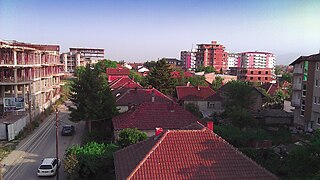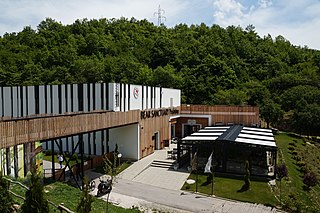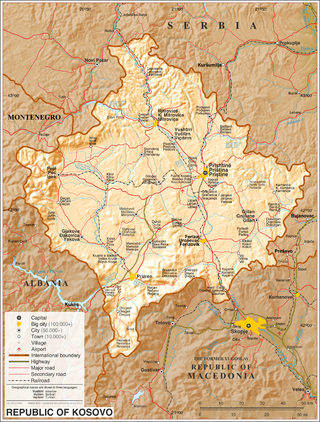This article needs additional citations for verification .(February 2024) |


Bregu i Diellit (Sunny Shore) also informally known as Kodra e Diellit (Sunny Hill),[ citation needed ] is a district of Pristina, the capital of Kosovo. [1]
This article needs additional citations for verification .(February 2024) |


Bregu i Diellit (Sunny Shore) also informally known as Kodra e Diellit (Sunny Hill),[ citation needed ] is a district of Pristina, the capital of Kosovo. [1]

Kosovo Polje or Fushë Kosova, is a town and municipality located in the District of Pristina in Kosovo. According to the 2011 census, the town of Fushë Kosova has 12,919 inhabitants, while the municipality has 33,977 inhabitants. The last official census tell’s that Fushë Kosova has 64,078 resident people.
The Llap Region is a region located in the north-eastern part of Kosovo. Llap in the broadest sense includes the watershed of the Llapi River. The Llapi water collection begins in the mountains of Kopaonik in the north and west and its source is considered to be the village of Pollatë, and ends by joining the Sitnica river in Lumadh, municipality of Vushtrri, in the north-west of Pristina. The topographic watershed of the Llapi River covers an area of 945.4 km2 (365.0 sq mi).

Kosovo District was a district of Kosovo and Metohija between 1990 and the end of the Kosovo War in 1999. From the Serbian point of view, the district continues to be part of the Republic of Serbia. It had a population of 672,292 and its capital was Pristina.

Lipjan or Lipljan is a town and municipality located in the Pristina District of Kosovo. According to the 2011 census, the town of Lipjan has 6,870 inhabitants, while the municipality has 57,605 inhabitants.

The People's Movement of Kosovo was a political party in Kosovo active after the Kosovo War, having originally been founded as a political movement of Albanian nationalists in 1982. Despite participating in several elections in autonomous Kosovo, its pre-war existence was its most historically significant period. Historically, its support and membership came from Albanian diaspora, especially within Switzerland and Germany, originating mainly from former Yugoslav republics.
Rifat Kukaj was a Kosovar Albanian and a successful writer in Albanian literature for grown ups and children.

The District of Pristina is a district in Kosovo. Its seat is the capital city of Pristina. It consists of eight municipalities and 298 villages. According to the 2024 census, the total population of the district is 511,938.

Zubin Potok is a town and municipality located in the Mitrovica District in Kosovo. As of 2015, it has an estimated population of 15,200 inhabitants. It covers an area of 335 km2 (129 sq mi), and consists of the main town and 63 villages.

Pristina or Prishtina is the capital and largest city of Kosovo. It is the administrative center of the eponymous municipality and district.
Sunny Hill is a South Korean K-pop group.

Popova Šapka is a peak in North Macedonia. It is over 1,780 metres (5,840 ft) above sea level and is a ski resort in North Macedonia.

The University of Pristina was founded in the Socialist Autonomous Province of Kosovo, Socialist Republic of Serbia, Yugoslavia, in the city of Pristina, for the academic year 1969–1970 and functioned until 1999. However, owing to political upheaval, war, successive mutual expulsions of faculty of one ethnicity or the other, and resultant pervasive ethnic-based polarisation, there came to be two disjoint institutions using the same name, albeit idiosyncratically to reflect ethnic identity. Albanian-language activity continues at the original location, whilst the Serbian-language University of Priština has relocated to North Mitrovica, where it maintains its place within the Serbian education system.

Pestova archaeological site is an archaeological site located in the village Pestova, in the municipality of Vushtrri, on the left side, stretched along the Pristina–Mitrovica road, more or less 4 km (2.5 mi) from Vushtrri. The area is known for a very fertile agricultural land, productive even in present days.

The Bear Sanctuary Prishtina is a sanctuary for rescued brown bears in Kosovo at around 22 km (14 mi) close to the city of Prishtina. The sanctuary is located near the Badoc Lake.
Bahri Fazliu (1971–1998) was a Kosovo Albanian poet, publicist and nationalist.

Pristina, the capital city of Kosovo, is one of the municipalities with the most severe water shortages in the country. Citizens of Pristina have to cope with daily water curbs due to the lack of rainfall and snowfall which has left the city's water supplies in a dreadful condition. The current water resources do not fulfill the needs of the overgrowing population of Pristina. The water supply comes from the two main reservoirs of Batllava and Badovci. However, there are many problems with the water supply that comes from these two reservoirs which supply 92% of the population in Pristina. As such, the authorities have increased their efforts to remedy the situation and to make sure that such crises do not hit the city again.

The National Theatre of Kosovo was founded in 1946 in the city of Prizren, Kosovo. It is the highest ranked theatre institution in the country, with the largest number of productions. The National Theatre is the only public theatre in Kosovo and therefore it is financed by Ministry of Culture, Youth and Sport. This theatre has produced more than 400 premieres which have been watched by more than 3 million spectators.

The National Gallery of Kosovo, formerly known as the Kosova National Art Gallery, is an art gallery situated at the University of Pristina Campus that focuses on 20th-century art.

Kosovo Pomoravlje, or Anamorava, is a valley in Kosovo, in the southern part of the District of Gjilan surrounding the Binačka Morava River. It stretches eastward to the Preševo Valley in southern Serbia. The mountains in this region, rising to an altitude of 1,000–1,200 metres (3,300–3,900 ft), border the Skopska Crna Gora region in north of Skopje. Gjilan, Kamenica, Novo Brdo and Viti are municipalities located in the region. The region gave its name to Kosovo-Pomoravlje District, which largely corresponds to its successor District of Gjilan in Kosovo.

The Jashar Pasha Mosque is a historical mosque in Pristina, Kosovo. The mosque was built in 1834 by the mayor of Skopje, Mehmet Yasar.